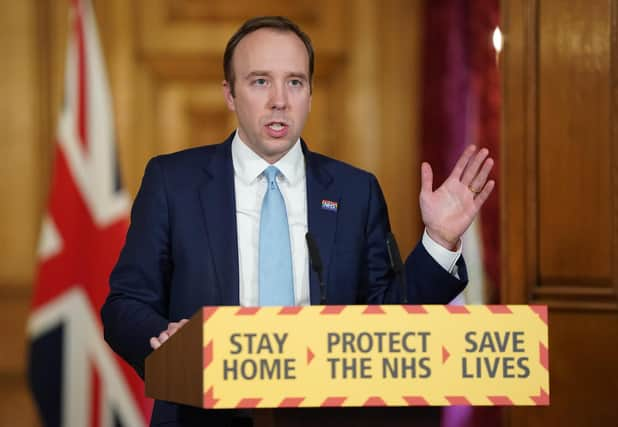Chaos as London and Edinburgh at odds on 100,000 test target


Health Secretary Matt Hancock reset the UK Government’s testing policy after intense criticism, promising 100,000 tests per day across the country by the end of April.
But following questions from journalists, officials in London and Edinburgh contradicted each other on whether the target applied to Scotland, Wales and Northern Ireland - before changing their answers.
Advertisement
Hide AdAdvertisement
Hide AdIt comes amid confusion over the level of cooperation between devolved governments on the procurement of coronavirus tests, with the Scottish Government issuing a late-night denial after the UK Government said it was taking the lead to avoid competition between the NHS in the four nations.
The chaos raises doubts about how well resources are being shared across the UK, and whether NHS staff and patients in Scotland will benefit from thousands of extra coronavirus tests.
Shortly after Mr Hancock’s announcement, the Prime Minister’s official spokesman told journalists that the testing drive would apply to England only, despite both governments hailing the creation of a pop-up lab in Glasgow as part of a UK-wide network to boost testing.
A press release from the UK Department of Health contradicted this, saying the increase in testing would take place “across the UK”.
After this was queried, a Department of Health official issued a correction, saying the extra tests were only being rolled out in England.
Meanwhile, journalists in Edinburgh were told by a Scottish Government official that the 100,000 target would extend to Scotland, suggesting potentially thousands of additional tests were on the way.
But late last night, the Scottish Government withdrew its statement, telling journalists that the issue would only be resolved this morning. At the time of writing, neither government has provided further clarity.
Admitting yesterday that countries like Germany had built up their testing capacity faster than the UK because they had a bigger network of laboratories and more domestic production of the chemicals and equipment needed, Mr Hancock launched a drive to scale up the British diagnostics industry to tackle the emergency.
Advertisement
Hide AdAdvertisement
Hide AdThe 100,000 pledge will include antigen or swab tests for those experiencing symptoms of coronavirus, targeted initially at patients and healthcare staff before being expanded out into the community, as well as blood tests for virus antibodies to check those who have already had the illness.
While the target only applies to England, a parallel UK-wide effort will be led by four pop-up labs being set up at Milton Keynes, Chester and in Glasgow, where the University of Glasgow will support the expansion of testing.
Returning to work after a week in isolation after testing positive for the virus, Mr Hancock said that by the end of April any NHS worker needing a test would be able to get one. The UK has only just reached the level of 10,000 tests per day for coronavirus, while Germany is performing 70,000.
There has been anger among NHS workers at the difficulty in getting tested themselves, meaning around 8 per cent of staff are off work without knowing if they have the virus.
At a press conference in Edinburgh, Nicola Sturgeon said 3,400 NHS staff and family have been tested, while the figure in England for NHS staff alone is 2,800.
Ms Sturgeon said testing for NHS staff would become less valuable as the epidemic progresses, since a higher proportion will have coronavirus symptoms because of the illness. And Mr Hancock defended previous policy of ring-fencing test capacity for patients “for whom the results of a test could be... the difference between life and death.”